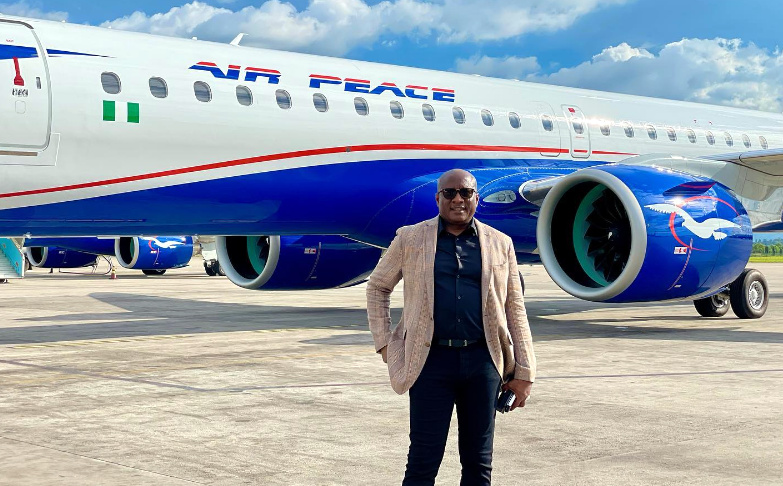...To get all news updates, Join our WhatsApp Group (Click Here)
Also Join our WhatsApp Channel (Click Here)
The United States government has piled more charges on the earlier $20 million bank fraud case against Allen Onyema, the CEO of Air Peace, as the Nigerian businessman continues to elude trial in an American court in the last five years.
Although Mr Onyema, founder of the major Nigerian airline, has denied wrongdoing, he has been wanted in the US over the bank fraud charges pending against him and a co-defendant at the District Court for the Northern District of Georgia, in Atlanta since 2019.
“On 8 October 2024, they were both charged in a superseding indictment alleging an additional count of obstruction of justice and one count of conspiracy to obstruct justice,” the US Attorney Office, Northern District of Georgia, said in a statement on Friday.
The office said Mr Onyema is accused of “obstruction of justice for submitting false documents to the government in an effort to end an investigation of him that resulted in earlier charges of bank fraud and money laundering.”
Prosecutors said he submitted false documents to US authorities in 2019 in an effort to stop the investigation and unfreeze his bank accounts regarding the alleged $20 million bank fraud.
Ejiroghene Eghagha, the airline’s Chief of Administration and Finance, accused of participating in the alleged obstruction scheme, as well as in the earlier bank fraud counts, is Mr Onyema’s co-defendant in the case.
“After allegedly using his airline company as a cover to commit fraud on the United States’ banking system, Onyema, along with his co-defendant, allegedly committed additional crimes of fraud in a failed attempt to derail the government’s investigation of his conduct,” the statement quoted US Attorney Ryan K. Buchanan.
Alleged conspirator already sentenced..
We reported that Mr Onyema remained wanted in the United States after an alleged conspirator in the $20 million bank fraud case was sentenced by an American court in September 2022.
In the decision, the US District Court sentenced Ebony Mayfield, an American woman, to three years’ probation for her roles in helping to facilitate the alleged fraud.
She escaped the prison sentence because she pleaded guilty early before her trial began.
Her lawyer also anchored her plea for probated sentence on the grounds that she was remorseful and cooperated with the government during investigations.
They also said she benefitted little from the alleged fraud, with Ms Mayfield confessing that she received only a total of $20,000 for her roles in the alleged conspiracy between 2016 to 2018.
CEO, co-defendant on the run……
While Ms Mayfield was battling with her trial, Messrs Onyema and Eghagha were on the run from the charges and arrest warrants.
The US government named Messrs Onyema and Eghagha in the 36 charges of conspiracy, money laundering, bank fraud, credit application fraud, and identity theft filed against them on 19 November 2019.
American authorities obtained court warrants for the arrest of the two men in the US and Canada, where part of the suspected proceeds of fraud was said to have been moved to.
Earlier, before the filing of the charges, Russell Vineyard, a magistrate at the United States District Court for the Northern District of Georgia, on 5 September 2019, issued a corresponding warrant of arrest for Messrs Onyema and Eghagha in Canada.
In another arrest warrant issued on 19 November 2019, Justin Anand, an American magistrate of the same court, ordered the US Marshals Service to take them into custody.
Both men have succeeded in evading arrest by American or Canadian authorities since then.
But US authorities arrested Ms Mayfield on 7 June 2019.
In December 2019, they charged her with signing and submitting fake documents to help Mr Onyema to facilitate the $20 million fraud between May 2016 and February 2018. She subsequently pleaded guilty and was sentenced in September 2022.
Superseding’ indictment….
The US government has now filed a superseding indictment in the nearly five years old case, introducing two additional counts, bringing to 38 the total number of counts now pending against Mr Onyema and his co-defendant.
US authorities accused Mr Onyema of moving suspicious funds from Nigeria to American bank accounts between 2017 and 2018 with the funds allegedly disguised as being meant to be used to purchase aircraft.
Mr Onyema and his co-defendant, Mr Eghagha, allegedly organised the fraud by applying for export letters of credit for the transfer of funds from a Nigerian bank account to the bank account of Mr Onyema’s Atlanta-Georgia-based firm, Springfield Aviation LLC, between 2016 and 2017.
The defendants, according to US prosecutors, applied for the funds purportedly for the purchase of aircraft by Air Peace from Springfield Aviation.
Both Air Peace, a major Nigerian commercial airline, and the US-based Springfield Aviation, are owned by Mr Onyema.
Prosecutors also said the aircraft referenced in each of the export letters of credit sent to the American banks was never owned or sold by Springfield Aviation.
They said the defendants made false statements and reports, and willfully overvalued property to influence the actions of the American banks.
Mr Eghagha was said to have sent the false documents, including fabricated purchase agreements, bills of sale, and valuation documents, to Ms Mayfield to sign and submit to the respective banks in support of the letters of credit.
Mr Onyema had engaged Ms Mayfield, who was at various times, a bartender, restaurant waitress, and nightclub dancer, in 2016, to act as a manager of Springfield Aviation, and enter into contracts on the firm’s behalf.
Prosecutors said she “had no connection to the aviation business outside of her role with Springfield Aviation and had no education, training, or licensing in the review and valuation of aircraft, including aircraft components.”
They alleged that Mr Onyema founded and used Springfield Aviation “to facilitate large transfers of funds from his Nigerian bank accounts to the United States.”
Mr Onyema allegedly moved about $15 million from Springfield Aviation’s account with a Wells Fargo Bank branch in Atlanta, Georgia, to his personal savings account with the same bank in 27 transactions in 2017.
Each of the 27 transactions stands alone as a charge of money laundering.
In May 2019, upon discovering that he was under investigation in the Northern District of Georgia for bank fraud, Messrs Onyema and Eghagha allegedly directed the Springfield Aviation manager, Ms Mayfield, to sign a key business contract, but also specifically told her to not date the document.
In October 2019, Onyema allegedly caused his attorneys to present that same contract, now falsely dated as being signed on 5 May 2016 (prior to the bank fraud that began in 2016), to the government in an effort to stop the investigation and unfreeze his bank accounts.
The submission of the alleged false documents forms the basis for the new count of obstruction of justice and one count of conspiracy to obstruct justice in the superseding charges.
“Allegedly, Onyema and his accomplices fraudulently used the U.S. banking system in an effort to hide the source of their ill-gotten money,” said Assistant Special Agent in Charge Lisa Fontanette, Internal Revenue Service – Criminal Investigation Atlanta Field Office, on Friday.
Denial…
An Air Peace spokesperson, in a telephone interview with our reporter on Saturday, dismissed the new development in the case as a mere recycling of the same set of allegations. The official said Mr Onyema’s legal team would give a more formal response in due time.
Meanwhiile, Messrs Onyema and Eghagha had denied the charges in previous press statements, the latest being the one he issued through a Nigerian law firm after the court sentenced Ms Mayfield in September 2022.
The statement by A.O. Alegeh & Co law firm was silent on the charges of fraud and money laundering against Mr Onyema and his co-defendant at the same court where Ms Mayfield was prosecuted.
But they maintained in the press release that the fact that Ms Mayfield was not given any prison sentence, confinement or home detention by the court confirmed that there was no fraud in the $20 million deal.
They added then that the US government “admitted in court today that no bank suffered any financial loss in this matter.”
The statement also denied that Mr Onyema paid Ms Mayfield $20,000 for her roles in the alleged fraud, and insisted that “all steps taken in respect of the Letters of Credit were taken in good faith and with legitimate funds.”
All the aircraft involved were brought into Nigeria and utilised in the operations of Air Peace Limited. There was no victim. There was no loss of funds to any person and there was no criminal intent whatsoever.”
The law firm added that various law enforcement agencies in Nigeria had reviewed the case and “no evidence of criminality” was established against them.
In the earlier statement he issued in the wake of unveiling of the charges in November 2019, Mr Onyema vowed: “to defend my innocence in the US courts.”
But despite the vow, Mr Onyema and his co-defendant have yet to appear before the court to take their plea.
Source: USA Department Of JUSTICE ⚖️
You can get every of our news as soon as they drop on WhatsApp ...To get all news updates, Join our WhatsApp Group (Click Here)
Also Join our WhatsApp Channel (Click Here)

















